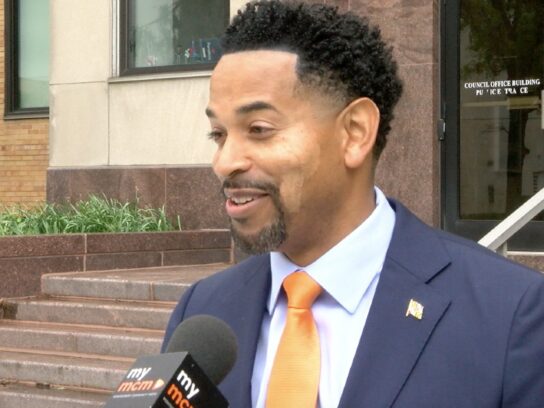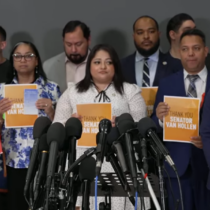
A bill that would prohibit police officers from asking people to agree to having their vehicle searched without probable cause was introduced Tuesday afternoon by Councilmember Will Jawando.
The Constitution’s 4th Amendment prohibits unreasonable search and seizures.
According to Jawando, while police do ask for the motorist’s consent, people are more likely to agree to do so when the request comes from a police officer.
“This is not truly voluntary consent,” he said.
Ending this practice would help people of color, who are most likely to be stopped, most likely to be asked for their consent to have their vehicle searched and most likely to agree, according to Jawando, who was a leading force in removing police officers from Montgomery County schools.
One out of every 205 traffic stops in Montgomery County during 2023 that resulted in a search yielded contraband, which is about. 0.5% of all searches, he said.
Called the Freedom to Leave Act, Jawando’s bill would also require better collection of certain data and information related to traffic stops and exclude the prohibitions on traffic stops from collective bargaining.
A public hearing on the act is set for Feb. 27.
Councilmember Kristin Mink called Jawando’s proposal “a good bill,” noting, “People shouldn’t feel coerced.”
According to Mink, “There are huge racial disparities” on who is asked to consent and who does consent. “This is often seen as an obligation” rather than a request, she said.
Councilmember Laurie-Anne Sayles agreed, noting that Blacks and Latinos are the most likely to be asked to agree to a search of their vehicle.
Between Fiscal Year 2018 and Fiscal Year 2022, Black drivers in Montgomery County made up 43% of all traffic stop searches.
Prior to the bill’s introduction, Jawando held a news conference where he recalled being 19 years and being pulled over by Montgomery County police “over 10 times in one year.” He never received a citation or ticket, he said.
The Montgomery County Chapter of the NAACP supports the Freedom to Leave Act, said Cherri Branson, the organization’s third vice president, during the news conference.
There is “a severe imbalance in traffic stops,” she said of those involving people of color. Her organization has been fighting this for more than 20 years, she said, noting, “Twenty years later, nothing has changed.”
Chuck Williams, a county resident, recalled how his son was pulled over by police for changing lanes but not using a turn signal.
According to Williams, the police officer would not let his son leave until he consented to a search, which Williams called “nothing more than a fishing expedition.” He also called it “vehicular stop and frisk.”
Also supporting the act is The Decriminalize Montgomery County Campaign, which noted in a news release, “When Vincent Miller, a Black man, was coerced into giving permission for a consent search in Glenmont, he and his passenger were held for over an hour. The search yielded no contraband. Miller and his passenger left terrified and harmed by the experience.”
The organization wrote, “Many drivers are pressured into giving consent because the police intimidate drivers and passengers, even when they know they can refuse. The pressure to consent can be heightened by the power imbalance between police and civilians, language barriers, disability, race, and past negative interactions with police.”


Comments are closed.